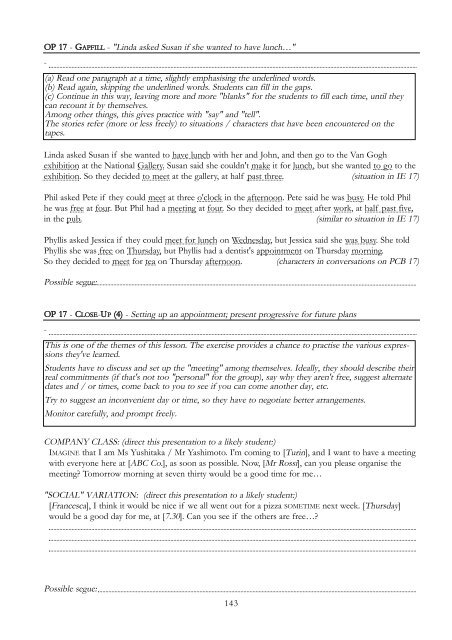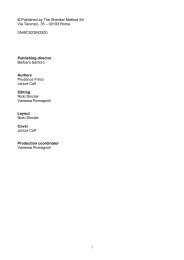O R A L P R A C T I C E Lessons 1 - 25 - Shenker
O R A L P R A C T I C E Lessons 1 - 25 - Shenker
O R A L P R A C T I C E Lessons 1 - 25 - Shenker
You also want an ePaper? Increase the reach of your titles
YUMPU automatically turns print PDFs into web optimized ePapers that Google loves.
OP 17 - GAPFILL - "Linda asked Susan if she wanted to have lunch…"<br />
-<br />
(a) Read one paragraph at a time, slightly emphasising the underlined words.<br />
(b) Read again, skipping the underlined words. Students can fill in the gaps.<br />
(c) Continue in this way, leaving more and more "blanks" for the students to fill each time, until they<br />
can recount it by themselves.<br />
Among other things, this gives practice with "say" and "tell".<br />
The stories refer (more or less freely) to situations / characters that have been encountered on the<br />
tapes.<br />
Linda asked Susan if she wanted to have lunch with her and John, and then go to the Van Gogh<br />
exhibition at the National Gallery. Susan said she couldn't make it for lunch, but she wanted to go to the<br />
exhibition. So they decided to meet at the gallery, at half past three. (situation in IE 17)<br />
Phil asked Pete if they could meet at three o'clock in the afternoon. Pete said he was busy. He told Phil<br />
he was free at four. But Phil had a meeting at four. So they decided to meet after work, at half past five,<br />
in the pub. (similar to situation in IE 17)<br />
Phyllis asked Jessica if they could meet for lunch on Wednesday, but Jessica said she was busy. She told<br />
Phyllis she was free on Thursday, but Phyllis had a dentist's appointment on Thursday morning.<br />
So they decided to meet for tea on Thursday afternoon. (characters in conversations on PCB 17)<br />
Possible segue:<br />
OP 17 - CLOSE-UP (4) - Setting up an appointment; present progressive for future plans<br />
-<br />
This is one of the themes of this lesson. The exercise provides a chance to practise the various expressions<br />
they've learned.<br />
Students have to discuss and set up the "meeting" among themselves. Ideally, they should describe their<br />
real commitments (if that's not too "personal" for the group), say why they aren't free, suggest alternate<br />
dates and / or times, come back to you to see if you can come another day, etc.<br />
Try to suggest an inconvenient day or time, so they have to negotiate better arrangements.<br />
Monitor carefully, and prompt freely.<br />
COMPANY CLASS: (direct this presentation to a likely student:)<br />
IMAGINE that I am Ms Yushitaka / Mr Yashimoto. I'm coming to [Turin], and I want to have a meeting<br />
with everyone here at [ABC Co.], as soon as possible. Now, [Mr Rossi], can you please organise the<br />
meeting? Tomorrow morning at seven thirty would be a good time for me…<br />
"SOCIAL" VARIATION: (direct this presentation to a likely student:)<br />
[Francesca], I think it would be nice if we all went out for a pizza SOMETIME next week. [Thursday]<br />
would be a good day for me, at [7.30]. Can you see if the others are free…?<br />
Possible segue:<br />
143



